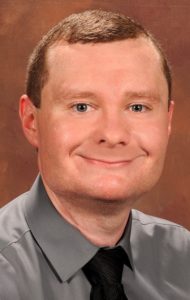Chemistry Speaker Series – Dr. Brian Agee
The second Chemistry speaker series talk for this semester is on Tuesday, November 9th 2:00

PM -3:00 PM on Microsoft Teams. This talk will focus on Green Organic Chemistry.
Speaker Bio: Dr. Brian Agee is currently a chemistry lecturer at Augusta University. He has a
Ph.D. in Environmental Science from Tennessee Technological University. Dr. Agee’s research focuses on green organic research. His research has recently been featured on ACS YouTube Channel in promotion of the ACS Fall 2021 meeting.
Investigating Alternative Metals for Zinc for a Green Synthesis of Nylon-6,6
Abstract: Nylon-6-6 is a material applied to many of our daily lives as well as a material that has become increasingly difficult to make. Nylon-6-6 is known for its durability in extreme weather and under strenuous circumstances. As the demand for nylon 6-6 increased, production increased with it as well as the use of the reagents needed to synthesize the compound. The synthesis of nylon 6-6 is a 5-step reaction; the following presentation will focus on the first step of the synthesis, with the product being cyclohexene. The difficulty of synthesizing nylon 6-6 is associated with the growing risk of extinction of its primary reagent, zinc. Zinc is currently 50-100 years away from extinction, giving focus to finding alternative methods of producing nylon6-6 with a replacement to it. Potential replacements that will be studied include aluminum, nickel, copper, cobalt, iron, and ferric oxide (rust). In addition to investigating an alternative to zinc, this study also focuses on implementing green techniques that are in line with the principles of green chemistry. Principles that will be studied include less hazardous synthesis, design for energy efficiency, and use of renewable feedstock. Less hazardous synthesis was accomplished by using metals that are not as harmful to the environment and that are less toxic to the experimenters. Design for energy efficiency was accomplished through the use of a solar reflective dish and water-saving condenser. The use of renewable feedstock was accomplished through the investigation of ferric oxide (rust) as a potential replacement and through the use of a solar reflective dish and water-saving condenser.
Microsoft Teams meeting
Join on your computer or mobile app
Click here to join the meeting
Or call in (audio only)
+1 470-737-4072,,632294974# United States, Atlanta
Phone Conference ID: 632 294 974#